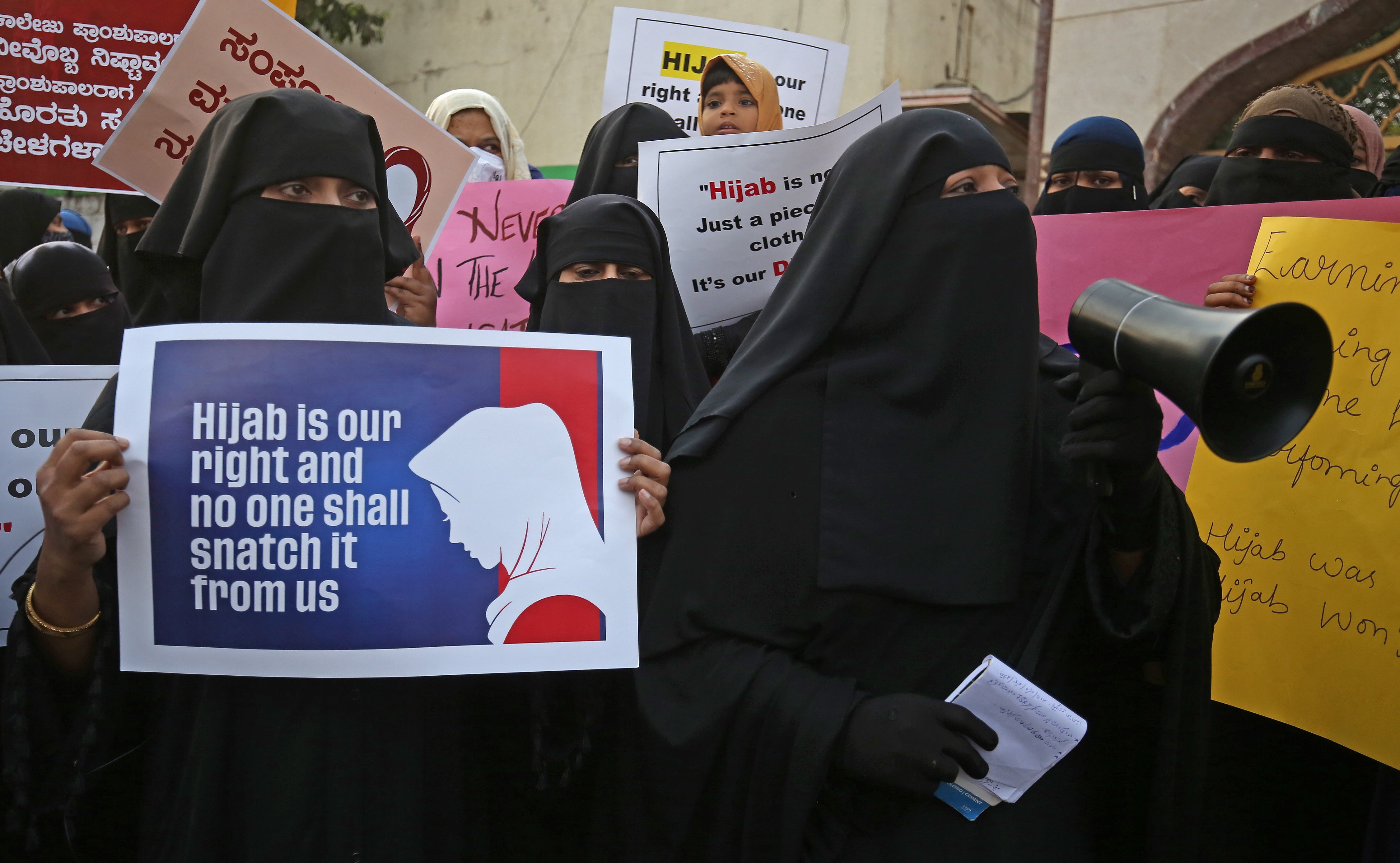India hijab row: Firebrand Indian minister says headscarves only worn by women ‘unsafe in own homes’
Protests continue outside colleges amid interim orders banning all religious symbols

Your support helps us to tell the story
From reproductive rights to climate change to Big Tech, The Independent is on the ground when the story is developing. Whether it's investigating the financials of Elon Musk's pro-Trump PAC or producing our latest documentary, 'The A Word', which shines a light on the American women fighting for reproductive rights, we know how important it is to parse out the facts from the messaging.
At such a critical moment in US history, we need reporters on the ground. Your donation allows us to keep sending journalists to speak to both sides of the story.
The Independent is trusted by Americans across the entire political spectrum. And unlike many other quality news outlets, we choose not to lock Americans out of our reporting and analysis with paywalls. We believe quality journalism should be available to everyone, paid for by those who can afford it.
Your support makes all the difference.A firebrand politician from India’s ruling Bharatiya Janata Party (BJP) has stoked a controversy after she said women who were not safe in their own homes needed to wear a hijab.
Her comments came amidst continuing protests over Muslim women’s right to wear religious headscarves in educational institutions.
Pragya Thakur, a BJP parliamentarian who is out on bail as a key accused in a 2008 bomb blast case, warned Muslim women against wearing headscarves in public, saying "it won’t be tolerated".
"In Hinduism, women are worshipped as goddesses. And the hijab should be worn when someone looks at you with an evil eye (or bad intention) ... There is no need to wear a hijab in public because a Hindu man will not make you feel unsafe — he worships women,” she said in her controversial speech during an event organised at a temple in the central Indian city of Bhopal.
Ms Thakur, known for making incendiary comments, said: “No need to wear hijab anywhere. People who are not safe in their houses wear hijab. You have a madrasa (Islamic schools). If you wear hijab there we have nothing to do ... outside, where there is ‘Hindu samaj‘ (Hindu society), they are not required...”
She was donning her usual saffron attire as she made the speech from stage to a crowd applauding and cheering her.
Her speech came as the Indian state of Karnataka remained gripped in tension over a bitter stand-off between a college and some of its students over their right to wear the hijab – a fight that has reached the court.
It all began on 28 December last year when students at the Pre-University College in Udupi, Karnataka, were barred from attending classes wearing hijab. The six teenagers of the college began protesting and the matter intensified. A case was filed by one of the students to overturn the ban.
As the matter quickly took communal tones with Hindu students launching counter-protest to oppose hijabs in institutions, the state government shut down high schools and colleges, fearing violence.
They re-opened this week, once again ensuing protests and minor incidents of clashes between the pro and against hijab groups.
On Thursday, the court once against adjourned a hearing to resume the pleas on Friday.
State advocate general Prabhuling Navadgi sought time to respond to the petitions as he awaited certain orders from the state government, he told the court.
Over 700 people, including 500 lawyers, law students, and other legal professionals, wrote an open letter to the concerned state authorities, condemning “the violation of constitutional rights of young Muslim women”.
“We are equally concerned by the interim order of the Hon’ble Karnataka High Court restraining ‘students regardless of their religion or faith from wearing saffron shawls, scarfs, hijab, religious flags or the like within the classroom,’” the letter stated.
The signatories said Karnataka High Court’s interim order of not allowing any religious symbols has led to many “instances of Muslim women and girls facing public humiliation”.
On Thursday, at least 20 students wearing headscarves were refused entry in Shivamoga DVS college after they refused to remove their hijabs.
Protests continued outside several colleges in the state, including Sarala Devi College in Ballari where students alleged bias as some Hindu students, wearing bangles, were allowed entry.
Amid simmering tensions, police imposed prohibitory orders in in Hubballi-Dharwad within a 200-metre radius of all educational institution till 28 February, news agency ANI reported.
On Wednesday, the advocate for the petitioners told the state high court that targeting hijabs singularly was an example of “hostile discrimination”.
Advocate Ravi Varma Kumar asked the judges why hijabs were being singled out when there were “hundreds of religious symbols from dupattas (a cloth accessory), bangles, turbans, crosses and bindis (a small coloured dot worn mainly by Hindu women between the eyebrows)” worn by people every day.
“No other religious symbol is considered... Why only hijab? Is it not because of their religion? Discrimination against Muslim girls is purely on the basis of religion and hence a hostile discrimination,” Mr Kumar argued.
A fresh petition was filed on Thursday seeking to allow hijabs to be worn in educational institutions on Fridays and the holy month of Ramzan.
Students’ petitioner Dr Vinod Kulkarni said banning hijab “amounts to banning Quran”, the religious Islamic book. The judge, however, exclaimed that the argument was a “bit far-fetched”.
Join our commenting forum
Join thought-provoking conversations, follow other Independent readers and see their replies
Comments